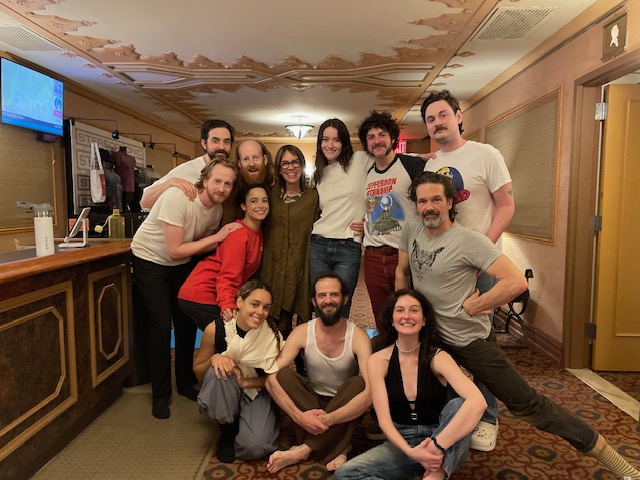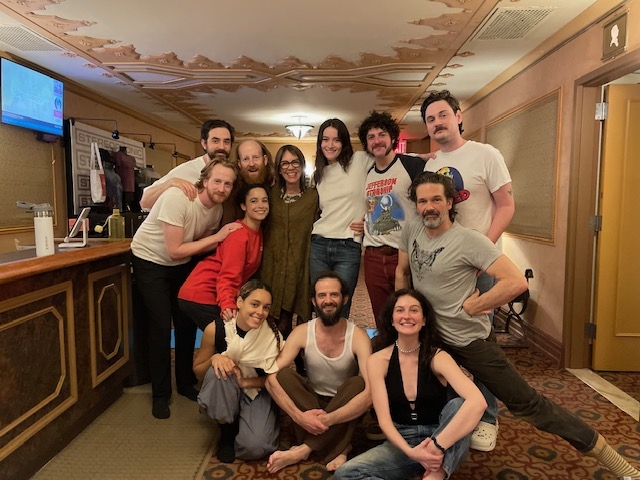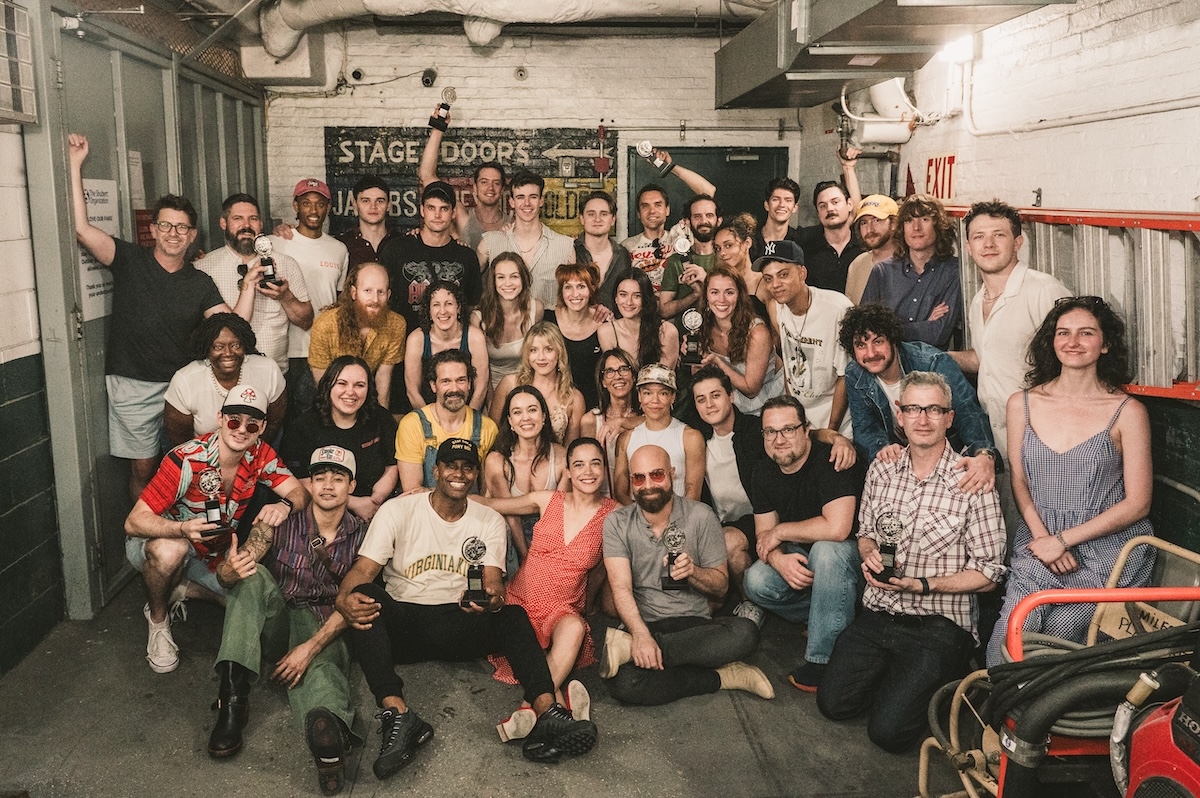Acting professor and singing teacher Gigi Buffington on developing an actor’s voice


Gigi Buffington (back row, fifth from left) with the cast of “Stereophonic”.
Gigi Buffington knows the power of finding your voice. In her profession, this process is considered an act of liberation – a shedding of inhibitions in pursuit of a freer form of expression. Buffington trained as a modern dancer and actress and has used her early professional experiences to carve out a niche for herself as a voice and text coach. Today, she guides actors toward a more authentic portrayal of the characters they play. Working with playwrights and stage directors, her training is aimed at a deeper understanding of the text at hand, whether it is the work of Shakespeare or that of frequent collaborators such as writers Will Arbery and Tracy Letts.
Buffington herself speaks in a rich, animated tone, suggesting the kind of eloquence she is exploring in her training. She divides her time between Tisch’s drama department, where she is an arts professor, and coaching actors in productions both on and off Broadway. Since early 2024, she has spent much of her time walking the corridor between the Golden Theatre and the Jacobs Theatre, where the neighboring Broadway stages have hosted two successful plays: the most Tony-nominated play of all time, Stereophonicand this year’s Tony winner for best musical, The outsiderAs coach of both productions, Buffington is the rare contributor who glides through the hallowed aisle and works with actors on both sides.
We recently checked in with Gigi Buffington to learn more about her highly specialized craft, the recent successes of Stereophonic And The outsiderand opens the door for a younger generation of artists.
Your life and career have been shaped by art. What led you after your early years as a dancer to your current training?
I was a modern dancer and the most exciting thing was the rare occasions when I got a line – someone gave me something to say. I did this production with a wonderful dancer and choreographer named Poonie Dodson, who later danced with Bill T. Jones and died many years ago when so many dancers in our community were dying of AIDS. Poonie and I choreographed a piece based on the myth of Orpheus and Eurydice. We were commissioned by a composer and there was a script, so I played Eurydice and Poonie played Orpheus – it was like a dance opera. But the thrill of getting to speak a few lines of text was really no stranger to me. I enjoyed the expression that came out of the mouth and when I started choreographing for theater companies in Chicago, I thought: God! This is so awesome.
My mother was a singer, and I sang growing up, but the speaking voice is very different. When I was working in theater, I was really drawn to it, and one thing led to another, and I started training as an actor. I did that here in New York at the William Esper Studio with Maggie Flanigan. I knew I needed vocal training—my voice was very soft, very muted, very closed off. So I did a two-year program to try to not only unlock the creative potential of my vocal dynamics, but to open doors. I studied with Robert Neff Williams, who was “the guy” at Juilliard. My acting training, coupled with that voice, speaking and text training… It was like everything opened up to me. I was completely in my element.
Was there a dominant model for singing instruction at that time? How did you discover and promote the idea of this type of training?
A few years later, I started working with a casting director who allowed me to work as a reader every day with wonderful actors who were being cast primarily for the Roundabout Theatre Company. That office was filled with great people and I found that I loved being on the other side of the table. I loved knowing that I could help an actor do their best work by listening, responding, and using all of my training to be their scene partner.
I moved back to Chicago for a while and was asked to teach at Columbia College Chicago. There was a real shortage of voice training in Chicago at the time, and I believe that what we personally need in our lives—what we lack—is what we are drawn to. For me, there is nothing that compares between the power and freedom of having access to your own voice and being cut off from your own voice. I know what it’s like to be cut off. I know what it’s like to literally not be able to make a sound, and I know (also) what it’s like to feel a bird fly out of my body and out into the world.

Buffington with the casts of Stereophonic and The Outsiders, gathered in the alleyway between the Golden and Jacobs Theaters.
Your work is so specific that it cannot be applied to a one size fits all approach. When you start a new project, how do you determine the requirements of a particular production?
Ideally, the playwright is in the room. So our job is to be midwives in the birth of this extraordinary thing. Will Arbery is a playwright I’ve worked with repeatedly; Tracy Letts is another. There are just so many brilliant playwrights out there. (For example) How do we take what David Adjmi channeled in terms of characters and text that have a very unique breathing system? They have a phrasing system that’s peculiar to them. They emphasize their way of speaking in a very unique way. How do we absolutely honor that and hold it sacred? You know what it says on this page. If we can release the body, the breath, the sound, and make the articulatory organs nimble enough to dance the dance in the mouth without becoming overbearing, then we have a visitation of that character that that playwright channeled.
So how do we do that? Well, in a room with Will Arbery, he makes room for me. He’s incredible. He loves this work. When we were working on it Salt costs in Evanston rise there were often sessions where he and I and one of the actors would work together. Or the director would say, “I’m going to work on this scene, you can use this and that,” and I’d go somewhere else. I’ve heard what the director wants, I’ve heard what the playwright wants, and I incorporate all of that into the work I do with the actor. So it’s not a Band-Aid. I think a lot of people think my role is that of someone who comes in and puts a Band-Aid on a problem. But ideally you’re nurturing from the ground up, which was the case with both of them. Stereophonic And The outsider.
In both pieces you work with young actors, similar to the way you teach at Tisch. What appeals to you about supporting the next generation of artists?
It’s very meaningful to be able to support students through a work that I’ve created – the curriculum. Young students come to us and think, ‘I know what this course is’, and they’re always completely surprised because it’s never what they imagined. It’s similar with the way I introduce them to – dare I say it – William Shakespeare. They know they don’t like Shakespeare and they all have their reasons for not liking it. I like that because I just listen to them. And then at the end of that one year of exploration, they all apply to RADA and The Classical Studio because they’ve fallen in love.
I said this before the pandemic and I’ll say it after the pandemic. The sensitivity to the world is a real thing and we have to be very careful. It’s like the shell has been broken and the yolk and the white have been exposed and we have to be careful not to break the yolk. I feel like it’s very easy to dismiss that kind of sensitivity. People have no patience with young people who experienced the pandemic when they were freshmen or sophomores in high school… But when you’ve taught and you’ve had a deep shared space with people who have gone through that at your age — that’s very real.
It is so meaningful to be able to open a door for someone. To help someone unlock their voice so they can express themselves in ways they didn’t think they could before… To help a student, not to stifle their creativity, but to support them on their journey so they can fly free and find their way into the professional world, is a wonderful experience. I find teaching to be an honorable task. It is a ministry, but I learn a tremendous amount from my students.



